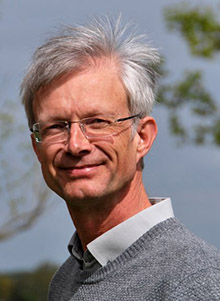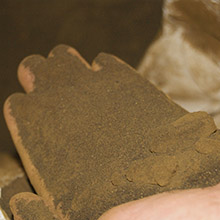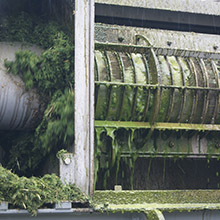SuperGrassPork
SuperGrassPork
- Organic pig production based on green protein
SuperGrassPork will develop a system for organic pig production, where a large part of the feed protein comes from locally produced clover grass.
The project will help to solve several important challenges in organic pig production:
Firstly, it will secure that feed protein can be procured for the growing production of organic pigs in Denmark
Next, it will secure that the pigs get a feed that is both 100 percent organic and tailored to the pigs’ need for essential amino acids. By avoiding conventional feed, the credibility of the organic production will be strengthened, and less nitrogen will be released from the pigs, when they need less protein to cover their need for amino acids.
Finally, more clover grass will be implemented in the crop rotations in organic pig production and at arable organic farms; this will increase the productivity, biodiversity and soil carbon content. At the same time, problems with weed and leaching of nutrients will be reduced.
Purpose of the project
The purpose of the project is to establish a sustainable solution in relation to achieving expanded and resource efficient organic pig production, based on biorefined feed protein from organic grassland crops.
The project focus on 1) optimisation and streamlining of biorefining techniques, 2) measurement and evaluation of the feed value of grass protein for pigs, 3) environmental and economic sustainability of grass feed production and 4.) possibilities for commercialising “grass protein” for organic feed production.
The project runs in 2017-2020
Project leader
Erik Fog
Innovationscentre for Organic Farming
Email: eikf@icoel.dk
Tlf.: +45 51 80 86 69

Results and recommendations
Great opportunities to produce grass protein for organic pig feed that can compete with organic soy protein
SuperGrassPork has greatly contributed to the increasing interest in grass protein for organic pig feed in Denmark as a potential replacement for organic soy protein during the project period from 2017-2019. It will be able to ensure organic pig production that is based on feed that is 100% organic, locally produced and with positive effects on carbon sequestration in the soil, biodiversity, weed control and resource efficiency. The project is based on experiences with protein extraction from e.g. clover grass from the MultiPlant and OrganoFinery projects.
The implementation of the production has taken place faster than expected, and therefore it is also expected that the proceeds will come faster and possibly be larger than first assumed.
The technology behind grass protein
The technique involves fresh grass being brought in from the field, finely chopped and pressed in a large screw press, whereby the grass is split into juice and fiber cake. The protein is extracted from the juice by either acidification or heat treatment followed by centrifugation, so that you have a protein concentrate with approx. 45 per cent dry matter and about 50 per cent. protein. The fiber cake can be used for cattle feed or biogas, and the residual juice from the centrifugation also goes to biogas. Via this technique, it has been possible to raise the protein content of the concentrate from 30-35 per cent. to 50-60 per cent. That is, higher than the 48 per cent that is in soya cake. At the same time, the dry matter content has been raised from 25-35 per cent. to 40-45 per cent, whereby a large amount of energy is saved for drying the concentrate. Attempts to store the moist concentrate, for example for use in wet feeding, have shown that it is possible for up to four months if the concentrate is extracted from fermented juice with a low pH, packaged oxygen-free and refrigerated.
The roast beef tastes as usual
The test pigs in SuperGrassPork had the same growth and feed utilization regardless of the amount of grass protein in the feed, and an increasing meat percentage with a high proportion of grass protein in the feed indicates that the digestibility of the grass protein is higher than expected. Quality assessment of the meat from the experimental pigs also showed no differences, either in taste, smell, color or texture. In return, the content of the healthy omega 3 fatty acid increases.
Results and experiences from the project have been shared at a seminar in September. 2018 at Aarhus University, Foulum, at the Biofach Congress 2019 in Germany, at a taste test of pork in Herning in March 2019 and at the final seminar at the Ecology Congress in November 2019. The project's results all point in the direction that there are positive opportunities in produce grass protein for organic pig feed, where it can compete with organic soy protein.
Prerequisites for a successful establishment and commercialization of organic grass protein in Denmark
What do customers, companies and organizations say about green biorefining? During the project, SuperGrassPork has published an extensive stakeholder analysis. The purpose of the analysis was to uncover attitudes, barriers and incentives for establishing the production of organic grass protein in Denmark. The report cements that there is a very large interest and openness to organic grass protein as an alternative to soy. Based on the analysis of interviews, it is further assessed that technological, logistical and financial challenges are the most important points that must be resolved before a value chain for the production and marketing of organic grass protein can become a reality. Furthermore, it is necessary to have long-term framework conditions and strategic measures with support from the authorities, so that the transition to a bio-economic agricultural system can be promoted.


